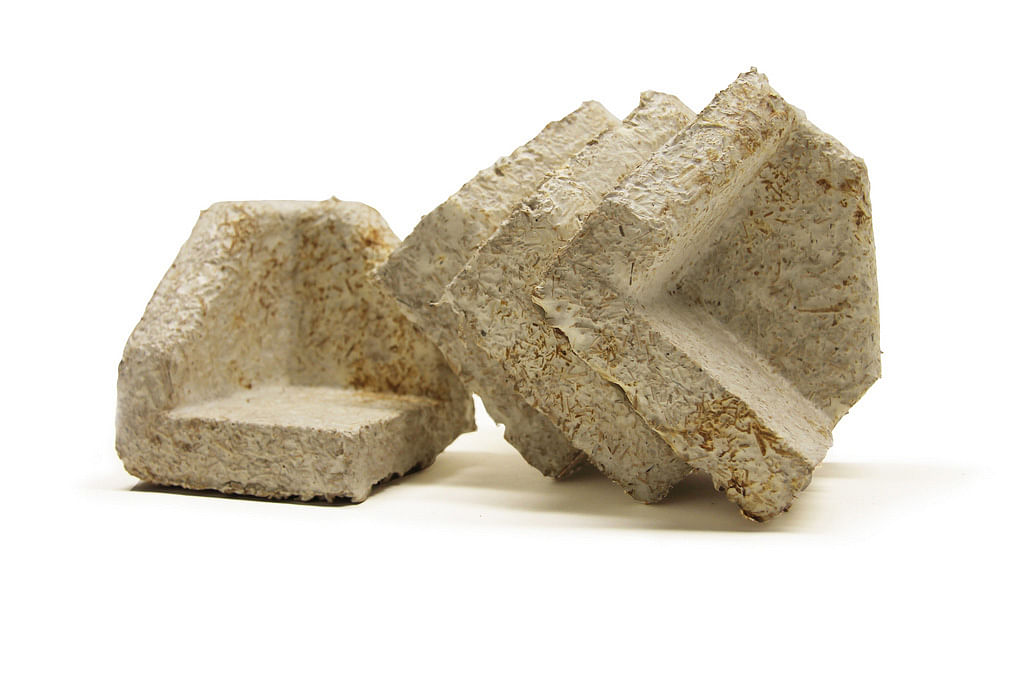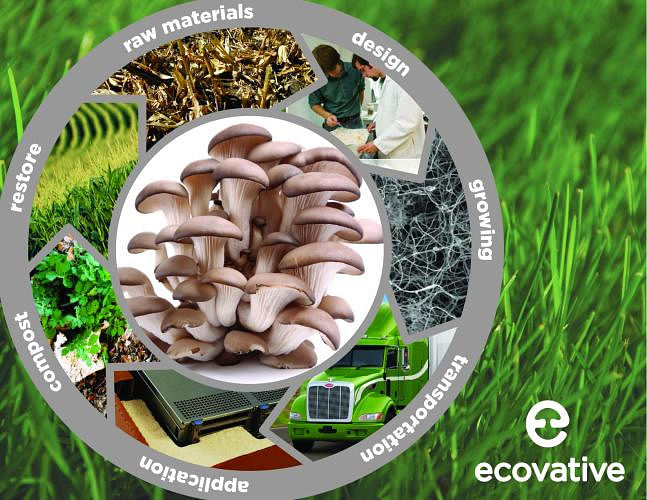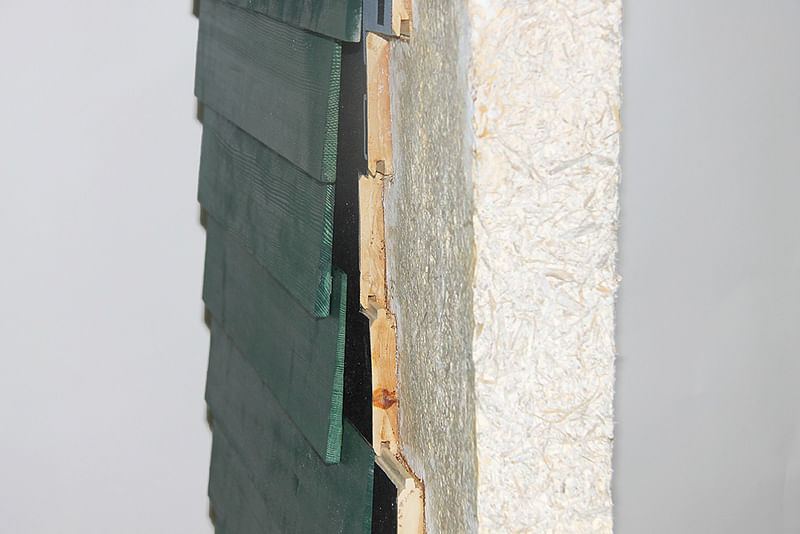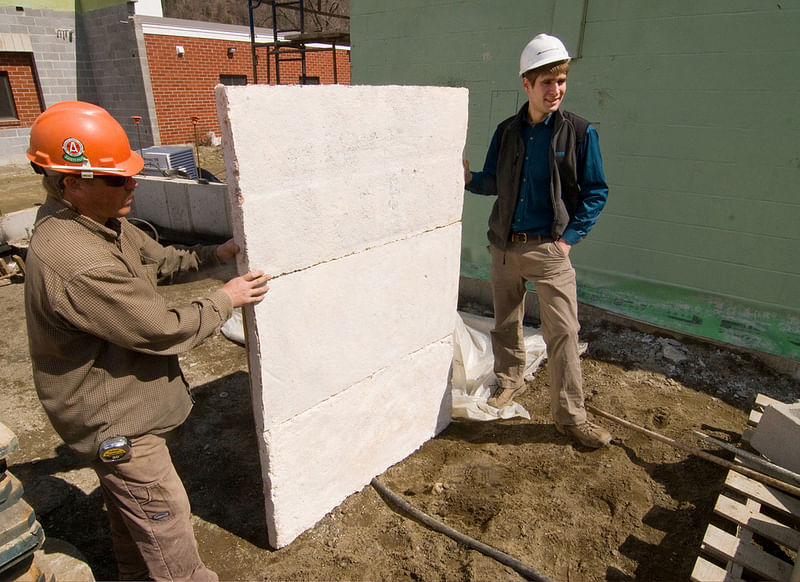'Mushroom Plastics' initiative Ecovative wins 2013 Buckminster Fuller Challenge
By Bustler Editors|
Tuesday, Oct 22, 2013

Related
In the past few weeks, the Buckminster Fuller Institute has been introducing numerous finalist entries for the sixth annual Buckminster Fuller Challenge, showcasing the finest examples of socially-responsible design.
Today now, the BFI announced the overall challenge winner: Ecovative, a Green Island, NY-based materials science company that has developed a new class of home-compostable bio-plastics based on living organisms, mushroom mycelia — a high-performing, environmentally responsible alternative to traditional plastic materials.
The 'mushroom material' inventors, Eben Bayer, Gavin McIntyre, and the Ecovative Team, will be awarded the $100,000 cash prize at a ceremony at Cooper Union in New York City on November 18, 2013.
Motherboard TV: UPGRADE: MUSHROOM PLASTICS
The review team and jury found that the Ecovative initiative best exemplified Buckminster Fuller's famous quote: "To change something, build a new model that makes the existing model obsolete."
"We answered the Buckminster Fuller Challenge because we believe in the power of our people to make a real, positive impact. Today, Ecovative looks forward to further answering Bucky's challenge, as we continue to innovate mycological biomaterials and reach an ideal state, with social and environmental considered equally with economics," said Ecovative co-founder and Chief Scientist, Gavin McIntyre.

Here's an excerpt from the full statement from the Buckminster Fuller Challenge review team and the 2013 jury:
"Maintaining or restoring the quality of water, air, soils and oceans is a fundamental challenge as human populations and resource appetites crest. Efficient use of resources is vital, but insufficient. Basic needs will continue to require growing volumes of materials -- for everything from tabletops to shoes, baby bottles to Band-Aids. Current production methods, however, have left us with a literal sea of troubles. Both the developed and developing world’s ecosystems and human communities are overwhelmingly feeling the effects of rapid resource extraction and growing waste streams tainted with hazardous and long-lasting pollutants. Current regulatory systems largely ignore the long-term implications of exposure to toxic substances and large flows of plastic and other synthetic waste."

"Current regulatory systems ignore the long-term implications of exposure to toxicity, unpredictable waste streams, environmental degradation and natural resource depletion that these materials cause, and while life-cycle and ecosystem services analyses are gaining traction, for the most part, the negative impact of these products is not given the attention it deserves.
Finding new models for manufacturing that don't diminish, and can actually restore, Earth's natural resources is an urgent priority. Ecovative, a six-year-old socially responsible materials business and initiative, has disrupted the materials industry with an innovative and cost-competitive natural alternative to petrochemical based plastics and other hazardous materials widely used daily across the world.
Their ‘mushroom material’, grown from living organisms, can be used in everything from protective packaging and furniture to insulation, footwear, even surfboards (and soon some electric car components). Ecovative’s vision is to become the first industrial age company with a net positive impact on the planet’s ecosystem, and they are well on their way. This means eliminating the negative environmental impacts of production associated with the plastics industry, producing a material that sequesters carbon, and delivers nutrients back to Earth."
Ecovative's Mushroom Tiny House
"Their approach, from inception to production, is an extraordinary example of the core tenets of The Buckminster Fuller Challenge’s entry criteria, which require the winning solution to be comprehensive, anticipatory, ecologically responsible, feasible, replicable, and verifiable.
From the materials science underpinning their work to the commitment to rewrite the rules regarding the structure and financing of a startup company, Ecovative is a ground-breaking enterprise."

"Highlights of the comprehensive approach:
- A closed loop production system using nature’s principles: The supply chain for the mushroom material was developed from the ground up, providing an alternative income source to farmers and other industries through the purchase of organic “waste” materials used as feedstock to grow fungal mycelia into any desired shape. Waste streams utilized for this have included, but are not limited to, agricultural waste, cellulose sludge from paper waste, lobster shells and even textile waste—all sourced within 500 miles of manufacturing. The end product is entirely natural, renewable, home compostable, having a net-positive impact while being high performing and highly cost-competitive.
- A model for the 21st century social enterprise: Ecovative has used creative methods to ensure long-term success. [By patenting their technology, they allow access to ideas and technology while avoiding technological compromise and market ‘greenwashing’. With their creative commons licensing, the technology is accessible to everyone, not just in an industrial facility but also in a home kitchen or field. Adhering to strict principles about how they raise their capital, they are avoiding the speculation and short-term gain interests common among “exit strategy” oriented investors, instead attracting long-term and ‘patient capital’ investors. Ecovative has pursued a “mycelial” strategy of partnering with—rather than attempting to compete with—packaging industry giants, becoming an influential force on a new era of green materials."

- "This is not just a Styrofoam substitute: Ecovative is already directing resources to research and development, and through scholarships, supports the next generation of socially responsible designers. They continue to develop new uses, such as growing materials to use in inexpensive housing. In one initiative, in Bolivia, the organization is developing ways to use domestic waste streams as a feedstock -- with significant implications for the developing world.
- An entrepreneurial success that springs from education innovation: Founders Eben Bayer and Gavin McIntyre developed the core ideas underpinning their products and production methods while studying at Rensselaer Polytechnic Institute, where teacher and mentor Burt Swersey challenged his students to develop marketable, innovative and profitable products that could at the same time improve the world.
The Buckminster Fuller Institute’s review team together with the 2013 jury are very pleased to award the sixth annual Buckminster Fuller Challenge $100,000 prize to Ecovative. This breakthrough solution now joins a stellar group of previous Challenge winners—truly exceptional strategies making the world work for 100% of humanity!"
To learn more about Ecovative and its innovative products and applications, click here.
All images and videos courtesy of Ecovative.

Share
0 Comments
Comment as :